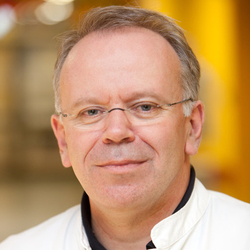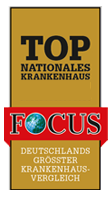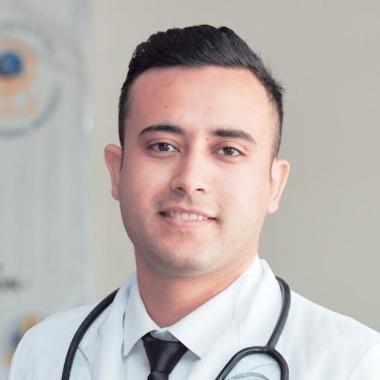University Hospital Leipzig

Head of the Department
Prof. Dr. Holger Christiansen
Department of Pediatric Oncology, Hematology and Blood Coagulation
Department of Pediatric Oncology, Hematology and Blood Coagulation at University Hospital Leipzig provides care for children and adolescents with blood malignancies and tumors. The management of patients takes place in an interdisciplinary fashion between all centers and departments of the hospital. The department is certified by the German Society for Pediatric Oncology and Hematology and is concerned with early detection, effective treatment, pain management and psychological support for children. It also offers autologous and allogeneic hematopoietic stem cell therapy.
Under the leadership of Prof. Dr. med. Holger Christiansen, the department treats over 720 inpatients every year, many of which are lymphoma patients. The research unit of the department is mainly focused on the Molecular Oncology field. Research projects where the mechanism of cancer cell formation, unstoppable growth and division of these cells as well as the latest pharmacological therapeutic measures are studied at the department to find and implement new treatment.
The Department of Pediatric Oncology, Hematology and Blood Coagulation at University Hospital Leipzig is specialized in the diagnosis and treatment of:
• Lymphoma
• Leukemia
• Anemia
• Multiple myeloma
• Polycythemia
• Thrombocytopenia
• Clotting disorders
- Holger Christiansen graduated from the Scholar School in Meldorf in 1976. He studied human medicine at the Justus Liebig University in Gießen. This was followed by training as a specialist in pediatric and adolescent medicine at the University Children's Clinic in Gießen, followed by further training in the area of ??Pediatric Hematology and Oncology in the independent department for Pediatric Oncology and Hematology at the University Pediatric Clinic in Gießen under the direction of Fritz Lampert.
- From 1987 to 1989 he was a fellow of the German Research Foundation ( DFG ) in Collaborative Research Center 215 with the project: Cytogenetics and Molecular Biology of Neuroblastoma.
- In 1988 he became an Inauguraldissertation on chromosome aberrations and oncogene - amplification in neuroblastoma doctorate.
- He was habilitated in 1995 with work on tumor cell genetic properties and their clinical importance in neuroblastoma
- He received the Venia legendi in 1996 in Pediatrics at the Justus Liebig University in Gießen.
- In 1996 he moved to the University Children's Clinic in Marburg and headed the area of ??Pediatric Oncology and Hematology as a senior physician.
- In 2003 he was appointed an associate professor at the Philipps University in Marburg.
- In 2009 he received the professorship for pediatric and adolescent medicine with a focus on oncology, hematology, and hemostaseology at the University of Leipzig, combined with the management of the independent department for pediatric oncology, hematology and hemostaseology in the Department of Gynecology and Pediatrics at the University Hospital in Leipzig.
Awards
- In 1989, the Justus Liebig University Gießen awarded him the prize for the best dissertation of the academic year 1988/89 in the field of human medicine.
- In 1993 he received the promotional award of 1993 from the Society for Pediatric Oncology and Hematology (GPOH).
- In 1995, his research on neuroblastoma was recognized with the 1994 Science Prize of the Kind Philipp Foundation
Publications
- H. Christiansen, F. Lampert: Tumor karyotype discriminates between good and bad prognostic outcome in neuroblastoma. In: Br J Cancer, 57, 1988, pp. 121-126, PMID 3348945.
- H. Christiansen, NM Christiansen, F. Wagner, M. Altmannsberger, F. Lampert: Neuroblastoma: inverse relationship between expression of N-myc and NGF-r. In: Oncogene , 5, 1990, pp. 437-440, PMID 2156211 .
- H. Christiansen, J. Schestag, NM Christiansen, KH Grzeschik, F. Lampert: Clinical impact of chromosome 1 aberrations in neuroblastoma: a metaphase and interphase cytogenetic study. In: Genes, Chromosomes & Cancer , 5, 1992, pp. 141-149, PMID 1381950 .
- HJ Terpe, H. Christiansen, F. Berthold et al .: Absence of CD44-standard in human neuroblastoma correlates with histological dedifferentiation, N-myc amplification, and reduced survival probability. In: Cell Death Differ, 1, 1994, pp. 123-128, PMID 17180025.
- C. Brinkschmidt, H. Christiansen, HJ Terpe et al .: Comparative genomic hybridization (CGH) analysis of neuroblastomas - an important methodological approach in pediatric tumor pathology. In: J Pathol , 181, 1997, pp. 394-400, PMID 9196436 .
- N. Bown, S. Cotterill, M. Lastowska et al .: Gain of chromosome arm 17q and adverse outcome in patients with neuroblastoma. In: N Engl J Med, 340, 1999, pp. 1954-1961, PMID 10379019.
- E. Bergmann, M. Wanzel, A. Weber, I. Shin, H. Christiansen, M. Eilers: Expression of P27 (KIP1) is prognostic and independent of MYCN amplification in human neuroblastoma. In: Int J Cancer, 95, 2001, pp. 176-183, PMID 11307151.
- B. Berwanger, O. Hartmann, E. Bergmann et al .: Loss of an FYN-regulated differentiation and growth arrest pathway in advanced stage neuroblastoma. In: Cancer Cell , 2, 2002, pp. 377-386, PMID 12450793 .
- A. Weber, P. Imisch, E. Bergmann, H. Christiansen: Coamplification of DDX1 correlates with an improved survival probability in children with MYCN-amplified human neuroblastoma. In: J Clin Oncol , 22, 2004, pp. 2681-2690, PMID 15226335 .
- A. Weber, J. Marquardt, D. Elzi et al .: Zbtb4 represses transcription of P21CIP1 and controls the cellular response to p53 activation. In: EMBO J , 27, 2008, pp. 1563-1574, PMID 18451802 .
- T. Otto, S. Horn, M. Brockmann et al .: Stabilization of N-Myc is a critical function of Aurora-A in human neuroblastoma. In: Cancer Cell, 6, 2009, pp. 67-78, PMID 19111882.
- A. Weber, S. Taube, S. Starke, E. Bergmann, N.M. Christiansen, H. Christiansen: Detection of human tumor cells by amplicon fusion site polymerase chain reaction (AFS-PCR). In: J Clin Invest, 121, 2011, pp. 545-553, PMID 21293059.
- E. Berger, R. Soldati, N. Huebener et al .: Salmonella SL7207 application is the most effective DNA vaccine delivery method for successful tumor eradication in a murine model for neuroblastoma. In: Cancer Lett , 331, 2013, pp. 167-173, PMID 23337288 .




